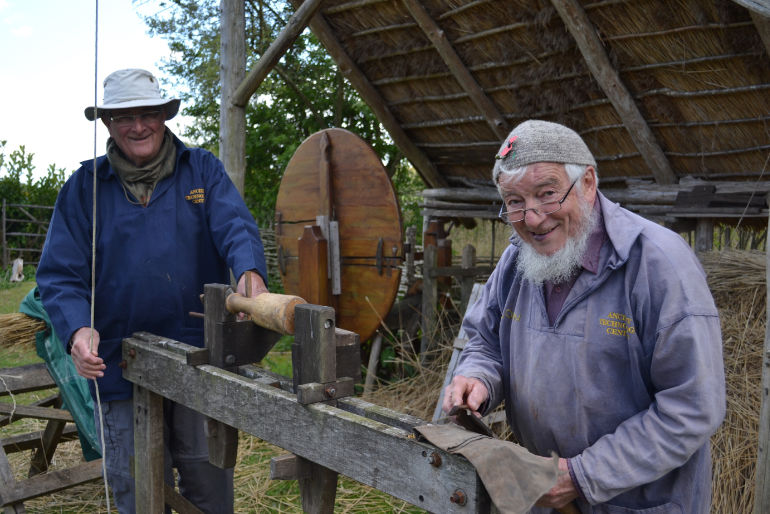Culture | Posted on June 3rd, 2021 | return to news
Queen’s Award for Voluntary Service for Ancient Technology Centre
The award given to the centre in Cranborne is the highest possible honour to be awarded to volunteer groups across the UK.

Volunteers at the Ancient Technology Centre (ATC) in Cranborne have not only the satisfaction of knowing they are helping to bring history alive, they have also now been awarded with the Queen’s Award for Voluntary Service (QAVS).
The QAVS is the group equivalent to receiving an MBE, and is the highest possible honour to be awarded to volunteer groups across the UK.
The accolade was created by the Queen in 2002 to celebrate the anniversary of her coronation, and is issued with her formal approval. It is awarded to volunteer groups who show outstanding initiative to bring far-reaching benefits to their communities.
Volunteers at the ATC – which is owned by Dorset Council and a cornerstone of the Dorset Outdoor Education Service – were nominated for the award following more than 30 years of hard work helping to create and run one of the south’s most unique learning environments.
For the past three decades teams of more than 30 volunteers with a diverse range of skills from carpentry and carving to blacksmithing and gardening, have worked with experts and paid members of staff to create the centre’s village of archeologically accurate historical buildings.
Structures include a Viking Longhouse, Roman Forge and water-wheel, an Iron-Age Roundhouse and Europe’s largest Earthouse. All constructions on site are painstakingly created using historically accurate building techniques. Local schools and community groups are encouraged to take part in constructions in order to learn first-hand how ancient peoples living in Europe lived and worked in ages past.
After construction, buildings are used to house hands-on lessons in skills such as historical cooking, archery, flint knapping, fire-lighting and blacksmithing. These experiential learning methods provide a wealth of opportunities for alternative learning provision suited to young people who struggle in traditional classroom settings.
Activities also encourage visitors to consider how the sustainable ways of living so essential to the survival of ancient communities could be used to protect the environment today.
In addition, the ancient village serves the wider community during weekends and holidays, with events including public open days, traditional oral storytelling, music nights, seasonal festivals, weddings and handfastings.
Anita Rigler, ATC administrator, who nominated the volunteers for the award, said: “The volunteers really are the backbone of the ATC. Our buildings on site wouldn’t exist without them and we couldn’t operate without them.
“In 2019 we had more than 4,000 schoolchildren to visit the centre, as well as university students, community groups and nearly 4,000 of members of the public. That’s a lot of footfall, and these are buildings made from natural materials, so the upkeep of the site is a mammoth task. Our volunteers allow our very small team of specialist tutors to reach more students by relieving them of many of the responsibilities required to maintain the site.”
Colin Alborough, 79, chairman of the Ancient Technology Centre Volunteers’ Association and an ATC volunteer for more than 15 years said: “We were so chuffed when we found out about the award. These buildings are a real labour of love; the Viking Longhouse alone has more than 26,600 hand-carved shingles on the roof. It took nearly four years to build – you couldn’t have done it without all the volunteers who were involved – it would have cost thousands and thousands of pounds. It’s fantastic for the team to have their hard work recognised like this.”
Clive Perrin, 82, who was first to sign up to the site’s team of permanent volunteers more than 20 years ago, said: “It’s absolutely amazing for the team to receive this award. One of the most rewarding things about this place is seeing children’s faces brighten as they grow in confidence and grasp a new skill – not many of them get to try practical skills at home anymore, especially things like wood work and fire-lighting. They love to have a go.”
Please share post:









